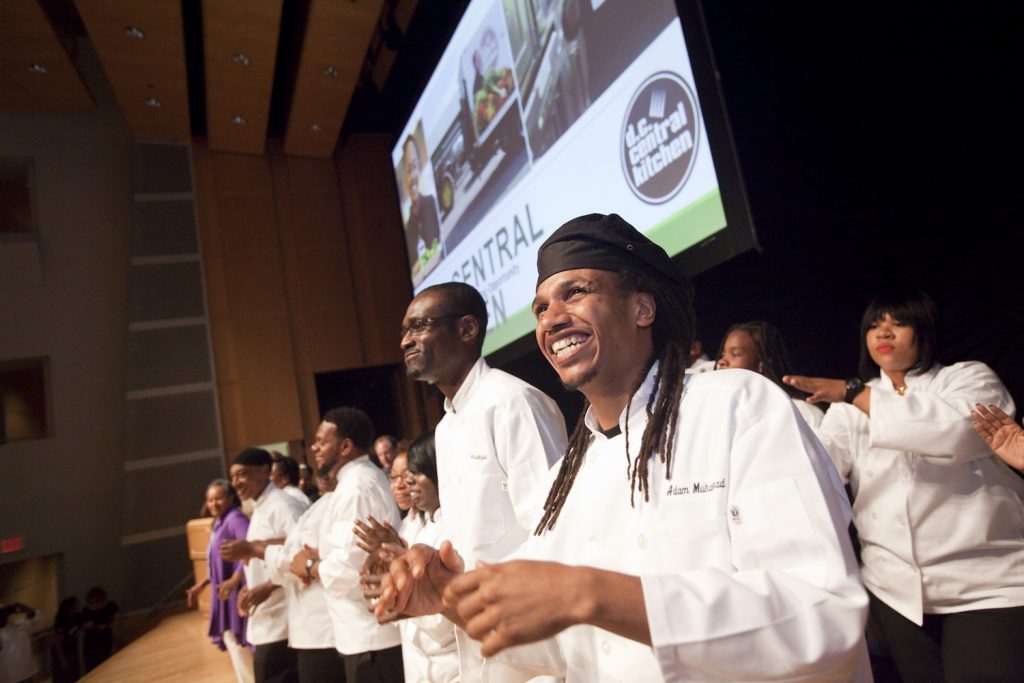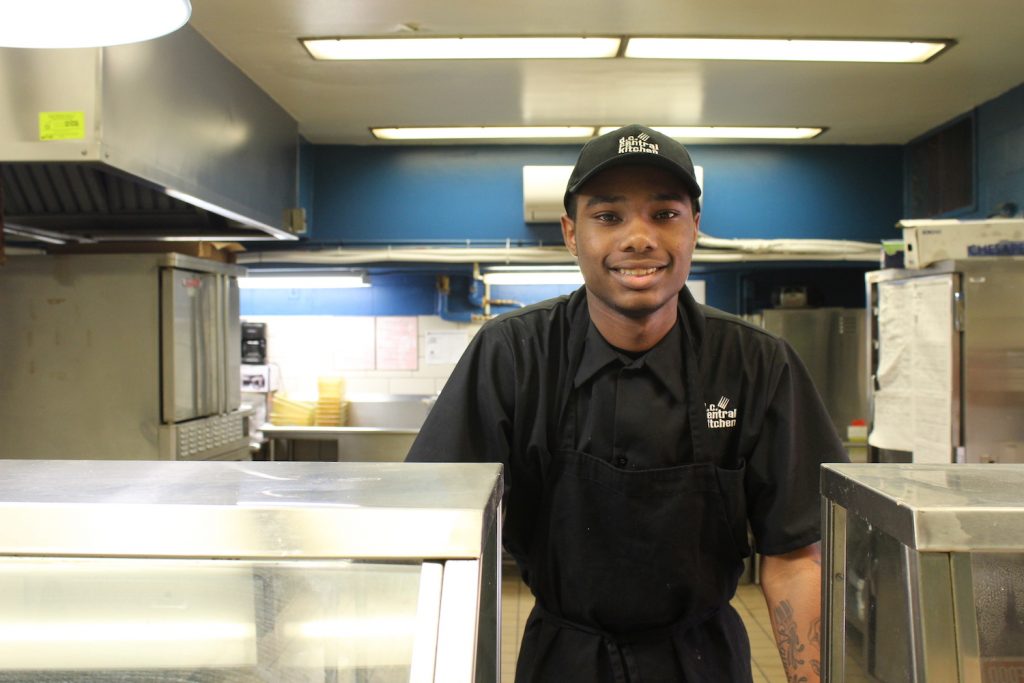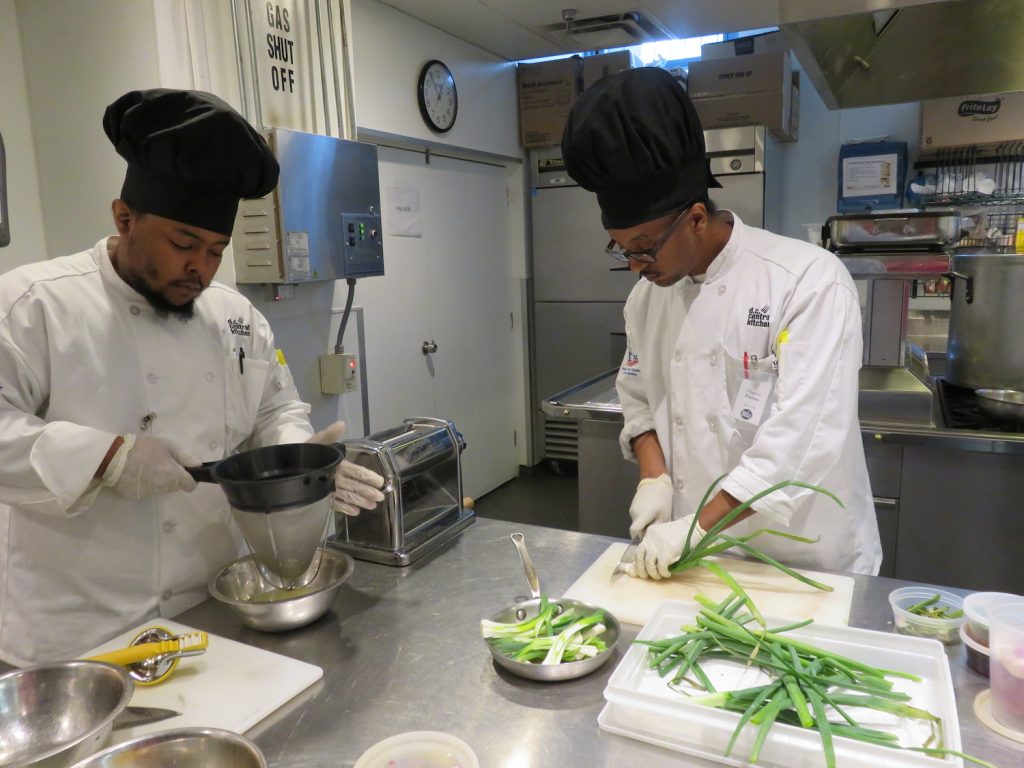
DC Central Kitchen serves up opportunity even amid search for a new home
Founded in 1989 as the nation’s first “community kitchen,” DC Central Kitchen uses food as a tool to build better communities. Each year it serves millions of meals to those in need and trains for culinary careers men and women who have had trouble finding employment. Almost 100 percent of the graduates are now making living wages with full benefits.
But its future location is uncertain, with the organization cramped in its current quarters in downtown’s largest homeless shelter. Meanwhile, the District’s headed real estate market is making it difficult for DC Central Kitchen to culminate a deal for a new site.
 Some of the kitchen’s ongoing ventures include culinary-job training, community nutrition programs, and efforts to promote healthy food in schools. Its Healthy Corners program delivers healthy and affordable food to corner stores in DC’s food deserts. The Campus Kitchens Project employs DC Central Kitchen’s food recovery and meal distribution model on more than 60 college campuses around the country.
Some of the kitchen’s ongoing ventures include culinary-job training, community nutrition programs, and efforts to promote healthy food in schools. Its Healthy Corners program delivers healthy and affordable food to corner stores in DC’s food deserts. The Campus Kitchens Project employs DC Central Kitchen’s food recovery and meal distribution model on more than 60 college campuses around the country.
Later this year, DC Central Kitchen will bolster its efforts in the city with a new program in Ward 8. DC Central Kitchen will occupy approximately 5,000 square feet on the campus of THEARC (Town Hall Education Arts Recreation Campus), a place where community members east of the Anacostia River can participate in dance and music classes, mentoring, tutoring, medical and dental care, and more.
“We’ve been humbled by the outpouring of support from residents, faith communities and neighborhood organizations as we’ve developed our plans for this new DC Central Kitchen satellite facility over the past year,” said Alexander Moore, chief development officer for the organization.
 “We will open our first-ever cafe, operate a commercial kitchen dedicated to preparing nutritious meals for nearby schools and youth programs, and perhaps most importantly launch a job-training program designed specifically for young people ages 18 to 25,” Moore said. “The cafe will serve as an immersive classroom for these students as they practice customer service skills, operate our point-of-sale system, and serve locally sourced breakfast, lunch and snack options.”
“We will open our first-ever cafe, operate a commercial kitchen dedicated to preparing nutritious meals for nearby schools and youth programs, and perhaps most importantly launch a job-training program designed specifically for young people ages 18 to 25,” Moore said. “The cafe will serve as an immersive classroom for these students as they practice customer service skills, operate our point-of-sale system, and serve locally sourced breakfast, lunch and snack options.”
DC Central Kitchen’s Culinary Job Training program helps adults who have had experiences with incarceration, addiction, homelessness and trauma. With the new Ward 8 site, young people who may be at risk for these challenges can get the help they need before having to face them.
“We’ll provide a welcoming, supportive environment where young people can learn transferable career skills and earn meaningful credentials while developing self-confidence and a sense of community,” Moore said.
According to Moore, they are “all in” for the expansion to THEARC. However, the new site is solely dedicated to new projects. The existing programs still don’t have a permanent home — and they’re badly in need of one.

“We’re totally out of space and our two existing facilities can’t keep up with residents’ demands for job training and community nutrition,” Moore said.
The organization’s current headquarters at the Federal City Shelter on 2nd Street NW are deteriorating rapidly. An April 2018 article in The New York Times on the worker shortage faced by the restaurant industry included remarks from Moore that the single biggest barrier to expanding DC Central Kitchen’s workforce-development programming was its cramped, aging facility.
“We’re telling anyone who will listen — District agencies, council members, philanthropists — that we need help to find a new home,” Moore told The DC Line. “This city has become so expensive and land so precious that identifying a site that meets our needs for kitchen space, storage and student accessibility within the borders of the District is no easy task.”
Moore said DC Central Kitchen believes it can add tremendous value to any part of the city through its job-creation power. It currently has 183 full-time employees, all of whom are earning living wages. DC Central Kitchen empowers local communities to develop their own solutions to food issues — for instance, the creation of a retail establishment for neighborhood residents.
Both the DC Council and Mayor Muriel Bowser’s administration have been active supporters of the organization’s workforce-development and community-nutrition programs. Bowser headlined the 100th culinary graduation ceremony a few years ago, and Moore names DC Council members Mary Cheh and David Grosso as allies and champions who understand that the kitchen’s work isn’t “just charity.” Council members Vincent Gray, Brianne Nadeau, Charles Allen and Kenyan McDuffie have all been instrumental in helping DC Central Kitchen make the most of its potential, he added.
 “One of the first things Council member Robert White did upon taking office was reach out to tour DC Central Kitchen, and Council member Trayon White prioritized meeting our culinary graduates and speaking at a recent DC Central Kitchen graduation ceremony,” Moore said. “We hope our friends across [the] District government will reach that same conclusion and help us find a new home soon.”
“One of the first things Council member Robert White did upon taking office was reach out to tour DC Central Kitchen, and Council member Trayon White prioritized meeting our culinary graduates and speaking at a recent DC Central Kitchen graduation ceremony,” Moore said. “We hope our friends across [the] District government will reach that same conclusion and help us find a new home soon.”
The DC Council’s Committee on Labor and Workforce Development — chaired by at-large Council member Elissa Silverman — was successful in inserting $1 million into the District’s budget to increase capacity at DC Central Kitchen, because it is one of the District’s most successful culinary-job-training programs, Ashley Fox, communications and outreach coordinator for Silverman’s office, wrote in an email.
Fox said the grant will help DC Central Kitchen purchase a new building, increasing its ability to produce healthy meals and helping to bridge the District’s food gap.
“When it comes to District taxpayer dollars, my goal is to put money where we know it will make a difference for our city and its residents,” Silverman said in a statement to The DC Line. “We want to prepare people for good, living wage jobs — and ensure that District workers actually get the wages and benefits they earn.”
“I have routinely been impressed and inspired by DCCK participants and graduates that I have met over the last several years,” Silverman added. “This new grant will help DC Central Kitchen as they relocate to a bigger and more suitable space, which will ultimately help our city and our residents as their operation grows.”
Unfortunately, the asking price of one particularly promising relocation site increased by millions in a matter of days, putting it beyond the organization’s reach, Moore explained. During council deliberations in early May, Silverman had referenced a Ward 5 parcel.
“We’re working hard every day to identify a site we can secure and eventually call home, and the earmark will play a critical role in helping us proactively seize any opportunity that comes our way in this seller’s market,” Moore said. “We’re enormously grateful that Council member Silverman was the first person to seriously invest in our efforts to find a new home, and we hope more members of our community will follow her lead.”
To join some of the 16,000 people who help prep meals each year, you can register for a shift here. DC Central Kitchen also recruits volunteers every Thursday during growing season to pick produce at nearby farms. Sign up for this and other opportunities on the website. For more information about DC Central Kitchen, you can sign up for the e-newsletter.


Comments are closed.